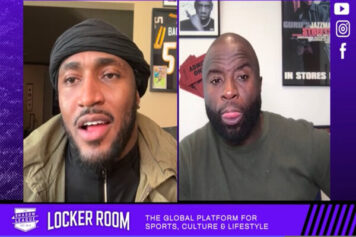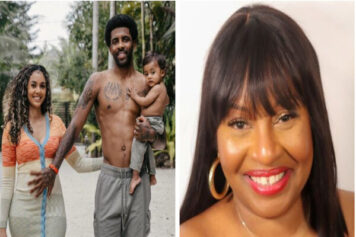It’s eight o’clock at night in a Starbucks parking lot in South Houston and John Lucas, the former No. 1 pick in the ’76 NBA Draft and notorious former drug addict, is watching his son, John Jr., play for the Toronto Raptors on the satellite television in his Black Cadillac Escalade. The 59-year-old is just off a full day of training, guru-ing and coaching basketball players at the no frills, stripped down, un-air-conditioned gym at Lutheran High School.
“My gym is hot, with no air conditioning and old school,” Lucas says. “I feel that it should be a privilege to play at the Toyota Center. It’s a privilege to play in Madison Square Garden. You shouldn’t be practicing in a place like that. I want you to go back to the basics and learn what a privilege it is to play in NBA arenas because there are athletes that have such entitlement. They’ve been treated like they were a star since AAU in the 10th grade.”
Lucas, still as energetic as he was when he started his day at six that morning, animatedly expounds on the merits of his program, John Lucas Enterprises, which has morphed from a full-on drug and alcohol rehab program to a wellness clinic that revolves around helping athletes become better in life as well as their sport.
“I know me when I see me,” Lucas says. “I do so much work trying to help others for selfish reasons. I’m helping myself. I don’t ever want to forget where I came from. I tell athletes all the time, I know me when I see me. “
What Lucas means is this: he knows an addict when he sees one. Like Heavy D (RIP) once proclaimed, “if you can’t see what I can see, you’re blind baby, you’re blind from the facts.” Lucas lived it. He breathed it. And now, 26 years after he admitted that he had a problem and faced it head on, he knows players better than they know themselves.
“I played, I coached, I’ve been involved in basketball almost 40 years,” Lucas said. “I’ve been the No. 1 pick, a middle of the pack player and a player that’s out the league. I’ve been a player that’s the 12th man to a player that’s the oldest guy on the team, so there’s not much in the experience position that I haven’t been in as far as a player. So when guys come to me with all of those issues, it’s easier to talk to guys and I found to have the most success because I’m telling them from experience. I’m not telling them something, I’m letting them see somebody that’s lived the sermon that I’m telling them.”
In person, it’s easy to see why players flock to the 713 to work with Uncle Luke.. He’s charismatic, he’s wise and, more importantly, he pulls no punches. He’s like Mike Tyson with the real, backing you into a corner until you can’t dance around it anymore. You’re forced to admit that you need help.
Help is a 12-step concept of each one helping one another to get back and no one is bigger than the whole. Lucas’ Miyagi mantra is simple: in order to beat drugs, alcohol and overcome any issue, you have to surrender to win. Thing is, you can’t just tell a professional athlete to surrender. It’s foreign, like Rick Ross’ MMG fleet. And to Lucas, no matter how many cheers you get when you tomahawk dunk in the lane, or how many dimepieces troll you on Twitter for groupie love, you’re just another Bozo on the bus. Your ‘Big Dog’ status doesn’t compute in his house. You’re just another guy that needs to improve, get better, overcome flaws and the best way to do it, is believing in a higher power, a spiritual being, someone greater than yourself.
Lucas hammers all of this home while adhering to his four tenets of coaching: motivating, mentoring, counseling and positive confrontation.
“I am the last house on the block in sports,” Lucas says. “When they come to see me, most of the time, they’re not coming on a winning streak. They’re just about a step away from it being over. And the few that we get that are coming like that, get what they want. And those that do the work, come back; and those that don’t, we’ll run you away. We call our gym ‘The Lab’ because we’re gonna put you back together.”
——————————
As horns blast at us to get the eff out of the way of the drive-thru so a clear path can be made to the steaming hot cups of Columbian, Lucas tells me about two very different iconic figures that inspire him—Muhammad Ali and, get this, Eminem.
“One of my favorite quotes that I tell my athletes all the time is from Muhammad Ali,” Lucas says. “He said, ‘I run on the road, long before I dance under the lights.’ That means if you put in the work, you’ll be ready when the lights come on.”
What about Em?
“One of the best philosophers I ever heard was Eminem,” Lucas says with a poker face. “He has that song ‘Cleanin' out My Closet.’ I get to go in people’s bedroom and get inside their closet. I'm not gonna get stuck in the living room. I get to see them at their weakest and most vulnerable point. Rather than you keeping me out in the living room where it’s neat and clean, I get to see the real issues, see what you're really about. You ain't gonna fool me, because I was there."
Four years after Tommie Smith and John Carlos raised their black-gloved fists for Black Power in Mexico City, Lucas was doin’ work for the Maryland Terrapins, earning first-team All-America honors in tennis and basketball. After four years of college bball, Lucas was the 1st overall pick for The Houston Rockets in ’76 and, with Moses Malone, immediately turned around the team’s fortunes. Lucas might have had a HOF career as a PG if it hadn’t been for his affinity for cocaine. Luke swam the river of denial for years until one night in ‘86, he hit rock bottom, waking up in the hood in urine-soaked clothes with no idea of how he’d gotten there. Two decades later, Lucas still goes to AA meetings because the demons are always there, haunting him, reminding him, never letting him forget.
“When I got sober in 1986 after my last game with the Rockets, I'd had enough with the drug use,” Lucas says. “And I don't go back there anymore because I was the first athlete to admit to having a problem and nobody knew what to do with me. So I came up with an aftercare program that has counselor and people in place for whatever a guy needs. Because I have a three-fold disease: it’s a compulsion of the body, a compulsion of the mind and a spiritual and emotional bankruptcy, which means I’m empty inside.”
——————————
Lucas knows that you don’t know what it is that he actually does for the athletes that come to get what he has to offer. But he attempts to explain it anyway:
“Most of the people who come here have lost confidence,” Lucas says. “They’re not playing enough and so everybody that comes here has to make 500 shots. We get them to get the right footwork and we get them to understand that by learning your spacing, you can play in any kind of system. I’m not coaching now I’m teaching. There’s a big difference in team development and player development. When a coach is coaching his team, you as an individual have to go out and get your own player development.”
Lucas still gets players who need help with substance abuse, but the main focus these days are players who come to him just to improve their basketball skills. He gets the players coming off major injuries and surgery. He has national elite basketball camps that start at the fourth grade level and go all the way up to the pros. There’s the pre-draft camp that runs from May up to the Draft in June. There’s player development, which goes all-year round to accommodate players like Sean Williams, Hassan Whiteside and Gary Forbes, who have been cut by NBA teams and are vying for another shot at the L. If a player needs to drop weight, there’s weight lifting and yoga for that. If they need counseling or just a swift kick in the pants, there’s plenty of that, too.
Then there are the college kids, who get popped for things like bad conduct and marijuana. For those that have been living under a rock, that’s former LSU cornerback Tyrann Mathieu. The Honey Badger was arrested last month for simple possession of marijuana, after being dismissed from the team for the same offense over the summer. Lucas tried to help the fallen Heisman hopeful, but even he can’t save everybody.
“He didn’t come back here,” Lucas says. “I don’t know that I would have let him come back. One of the things in sports – through agents, through former buddies who are playing in the game – everybody wants that window. If you are on drugs or have issues, you gotta do the work. And I thought he made some great strides in being here and I really didn’t want him to go back to school. I wanted him to stay here and continue to get growth and process and if he was doing really well, but I knew any one incident would mean the end. Too much vulnerability to someone who was so fresh in a form of recovery and most people – any young athlete – doesn’t believe it’s a problem. They just think you got me on the wrong day.”
Other failed cases include Renardo Sidney, who still hasn’t made it back to the hype that followed him since he was in high school. You have to do the work, Lucas says, or it’s all meaningless.
“Some people want to come here and use me to get back to where they were and not do the work,” Lucas says. “They expose themselves. You can’t stand next to me and get the gift of sobriety. You have to do your own work. I call it ‘Row, Row, Row your boat.’ I’m gonna put you in the water, give you two paddles and you have to get to where you’re going. Most athletes have great discipline in the game; they just don’t have great discipline in life. It’s my job to help get them that life discipline.”
Lucas has too many success stories to count. There’s DeAndre Jordan (offense), TJ Ford (bad back), and most recently, the Brooklyn Nets’ Andray Blatche (bad reputation and conditioning). But when pressed, as we part ways and he’s still watching the Raptors take on the Indiana Pacers at Bankers Life Fieldhouse on his smallish in-dashboard television, the player success story that stands out most in his mind—and it has nothing to do with substance abuse or bad attitude or injury—is John Jr.
“I’m the proudest of my son John. He just loves everything about being a pro. He doesn’t care if he plays or not. He’s had to be out the league a couple of years, playing in the D-League, he didn’t get drafted, LeBron jumped over him, got a chance to play when Derrick Rose got hurt, had some good games and he just keeps on the grind and willed himself to be a pro and that had to come from somewhere”
With all of the different hats Lucas wears—coach, teacher, counselor, guru—the most important role to him, still, is father.



